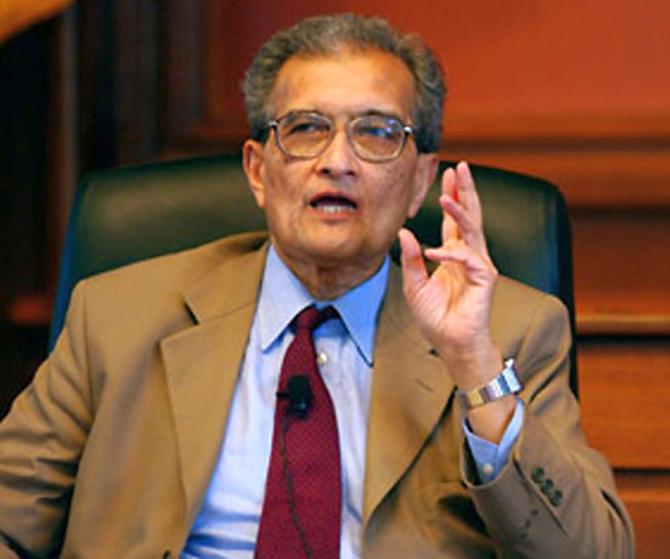Nobel laureate Amartya Sen has voiced concern over "curtailment of space" for protest and discussion in the country where people are jailed without trial through arbitrarily imposed charge of sedition.

The Bharatiya Janata Party, which is often the butt of criticism by the economist, rubbished the accusation as baseless.
In an e-mail interview with PTI, the 87-year-old Harvard University professor backed the farmers' protests against three agricultural laws, insisting there was a "strong case" for substantial review of the legislations.
"A person whom the government does not like may be declared by the government to be a terrorist and imprisoned. Many opportunities of public protest and free discussion have been curtailed or closed.
"People are jailed without trial through arbitrarily imposed charge of sedition," he alleged.
The celebrated economist deplored that young activists like Kanhaiya Kumar, Shehla Rashid and Umar Khalid are often treated like enemies.
"Rather than treating young and visionary leaders, committed to peaceful and non-violent ways like Kanhaiya or Khalid or Shehla Rashid as political assets who should be given the opportunity to pursue their pro-poor initiatives in a peaceful way they are often treated as enemies to be suppressed," he claimed.
Reacting sharply to Sen's views on allegedly shrinking space for debate and dissent, BJP's national general secretary Kailash Vijayvargiya said his contention was baseless and he should refrain from "maligning the country".
Meanwhile, West Bengal chief minister Mamata Banerje said Sen is being attacked by the BJP for his views against the Union government.
"Amartya Sen is being attacked for his views against the Union government just like I am being attacked for my political views. This is completely unacceptable," she told reporters in Kolkata.
A combative Vijayvargiya reacted sharply to Sen's claim about lack of debate and dissent in the country under the BJP-led government.
"The allegations are baseless. Mr Sen is a noted economist but we are all well aware of his ideological views and his views towards the BJP. The people of this country have voted decisively for the leadership of Prime Minister Narendra Modi and BJP. Mr Sen should refrain from maligning the country," he said.
When asked for his views about the BJP-led government that were often interpreted as pro-opposition, Sen said," When a government makes a mistake that harms people, it is not only permissible to speak up, it is actually necessary. Democracy demands that!"
Sen said there is a strong case for substantial review of the three contentious farm laws which have sparked protests by agriculturists.
"There is certainly a strong case for revising the legislations substantially. But the first necessity is a proper discussion rather than making allegedly big concessions that actually make very little real concession," said Sen.
Sen's comments come in the backdrop of thousands of farmers protesting at Delhi's borders for a month demanding repeal of three agricultural laws enacted in September and a legal guarantee on minimum support price.
While the government insists these laws constitute major reforms to help farmers, protesting unions have maintained these will leave them at the mercy of big corporates by weakening mandis and the MSP regime.
Responding to Sen's position on farm protests, Vijayvargiya said the government has made all efforts to address the issues and concerns raised by the farmers' unions.
Sen also said there are big gaps in the treatment of disadvantaged communities in India.
"Perhaps the biggest lacuna is a combination of policies that have led to such a terrible expansion of child undernourishment. To reverse that, we need different policies in many distinct fronts."
On the country's efforts in battling COVID-19, Sen said India was right to see the necessity of physical distancing but was wrong in imposing the lockdown with almost no notice.
"It was also mistaken in ignoring the need for poor labourers to earn an income," he said, referring to the lockdown that rendered crores of people jobless and triggered a massive migration of labourers, arguably the biggest since Partition.
Stressing on the need for "more intelligent reasoning and a humane touch" in implementing the COVID-19 strategy, Sen said India had got some ideas right, but "messed up" its response by overlooking the country's reality of extensive inequality.
The presence of huge inequality should influence every aspect of India's policy making, he said.










 © 2025 Rediff.com -
© 2025 Rediff.com -